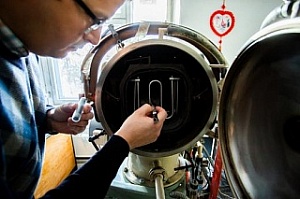A team of TSU young scientists has begun in-vitro experiments to study the biocompatibility of new porous material based on titanium nickelide (TiNi) with human tissues. The physicists seek to develop a set of conditions under which it will be possible to create alloys based on TiNi with certain characteristics, for the manufacture of medical implants or devices operating in the Far North at low temperatures, and, conversely, with heat-resistant properties.
Earlier, the staff of the TSU Laboratory of Medical Alloys and Implants with Shape Memory developed a new method for producing alloys with special terraces for better adhesion - coupling with living tissues. Now, with the support of the Russian Science Foundation, they are developing conditions for producing porous samples based on titanium nickelide of various compositions and structures.
- The material used for implants has a lot of properties: porosity, pore distribution, average pore size, chemical composition, and deformability - but for each case certain parameters are needed. Strength is more important in some places, and elsewhere, the ability to stretch and contract together with the tissues of the human body, - says Sergei Anikeev, project manager, a senior researcher at the laboratory. - Obtaining a wide range of materials helps to cover many properties and select the mode to obtain the necessary characteristics.
To test samples of different configurations for compatibility with living tissues, scientists use breast cancer cells - they divide rapidly over time and are well suited for experiments. To conduct research at TSU, special samples with a two-dimensional porous structure were made: they are obtained by baking TiNi powder onto the surface of monolithic slabs.
- We put the material in the cell medium and see how the cells grow or die there. And then, depending on this test, we decide what needs to be improved and how to modify the material, - says Oleg Kokorev, MD, a senior researcher at the laboratory. - If earlier all biocompatibility tests were carried out mainly on animals, now it can be studied on various cells of the human body in an in-vitro experiment, it is included in all standards.
The project results will be the basis for the development of domestic technology for new biocompatible porous-permeable materials based on titanium nickelide with optimal structural and functional properties for implantology. However, the scientists emphasize that such alloys will also be in demand for creating materials for operation in the Far North or, conversely, at high temperatures.

